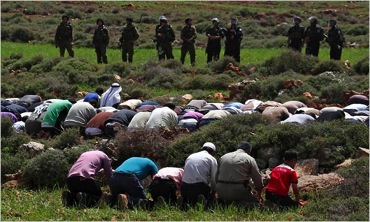A Jewish American on the verge of visiting Israel finds internal as well as external conflict

Nablus, watched by Israeli soldiers. But that’s not all it shows. Is it a questionable editorial in the form of a front-page photo? Probably. But it’s not a retouched photo either; it shows something real.
I’ve recently been approved by the Fulbright Foundation for a six-week visit to the Hebrew University of Jerusalem in May and June. I’ll be mainly at the Braun School of Public Health, on the Ein Kerem campus, giving seminars on evolutionary medicine and medical anthropology. I’ve been to Israel eight times, but never for more than two weeks, and it’s been far too long, seven years, since the last time—since my son, then 22, and I roamed the country visiting nature preserves and kibbutzim, the two things Adam was most interested in. A lot has happened since then.
Among them have been the death of Palestinian leader Yasser Arafat, the Israeli withdrawal from Gaza, the death-in-life coma of Prime Minister Ariel Sharon, the Second Lebanon War , Jimmy Carter’s ill-advised PR campaign against Israel, the failed British academic boycott of Israel. I wrote about some of these in The Atlanta Journal-Constitution and elsewhere , and then over the last three years I blogged about further unfolding events:
The 60th anniversary of Israel’s independence, the Olmert scandals, the terrorist attacks on Jews and others in Mumbai , the Gaza War , the return to office of Bibi Netanyahu , the antics of his racist sidekick Avigdor Lieberman, the (now partly retracted) Goldstone Report , the Mavi Marmora incident on the high seas, and the revolution in Egypt that—whatever else it did—altered Israel’s strategic situation.
Throughout, I have rarely criticized Israel, in fact I have gone on record saying that Jewish Americans shouldn’t do that. I was known in Atlanta for helping to limit Jimmy Carter’s influence, even on his home turf. I lost some left-wing American friends because of what I wrote during the Second Lebanon War, and others during the Gaza incursion. I defended Israel against all comers, but not from any particular point of view.
Although I’m glad AIPAC is there, I’ve stayed aloof from it, because at times when Israel had Labor leadership—it seems an impossible age ago—that organization stayed to the right of that government on some issues. And I’ve mostly steered clear of left-wing parties and groups in Israel because, if they can’t persuade their own fellow-countrymen, who am I to put my two cents in?
Did I serve in the IDF? Do I have a son or daughter who will? Do I look at the Georgia sky and wonder if a katyusha, or a SCUD, or for that matter an Iranian nuclear missile might come down from it one day to obliterate me and those I love? These questions have always been decisive for me.
But although I am not an Israeli, I am an American, and I am expected to cast my vote and use my freedom of speech to be one of Israel’s Jewish ambassadors. Since I have the skill and connections to write for public consumption, I feel an extra weight of responsibility. I love Israel, and have as long as I can remember.
That means, from just after World War II, when I learned to talk and formed my first memories, just as the full facts of the Shoah were coming to light, and as Israel itself was born, in part out of the ashes. That is not Israel’s raison d’être —it is the ancient homeland of the Jewish people, where they had a right and an obligation to return after countless persecutions. And return they did, long before the Shoah.
But that event, as the culmination of millennial victimization, convinced the world of the need for a Jewish state. Now however the world may be changing its mind, and the so-called one-state solution is seen in many quarters as a viable and even perhaps inevitable option. That would bring an end to the Jewish character and destiny of Israel.
The difficulty is that another people—as I have written as well—also has a legitimate claim to part of the land. The only alternative is a two-state solution, soon. Even Netanyahu, dragged kicking and screaming to this conclusion, recognized the need for it in a landmark speech in 2009 —after which he and his government did little to advance that solution, while encouraging the expansion of Jewish settlements that almost the whole world calls illegal.
So a growing group of nations outside the Arab and Muslim worlds are already recognizing or moving toward recognition of a Palestinian state. The photo above illustrated an article about a forthcoming UN vote in September that could grant membership to the State of Palestine. The world is losing patience with Israel. I am not, but for what it’s worth, I am very, very worried. That is why I find it difficult to write, and even a little difficult to go—not because I’m afraid, but because I’m not sure I know any longer what to say to my friends when I go. But I will be doing both in the weeks to come.
